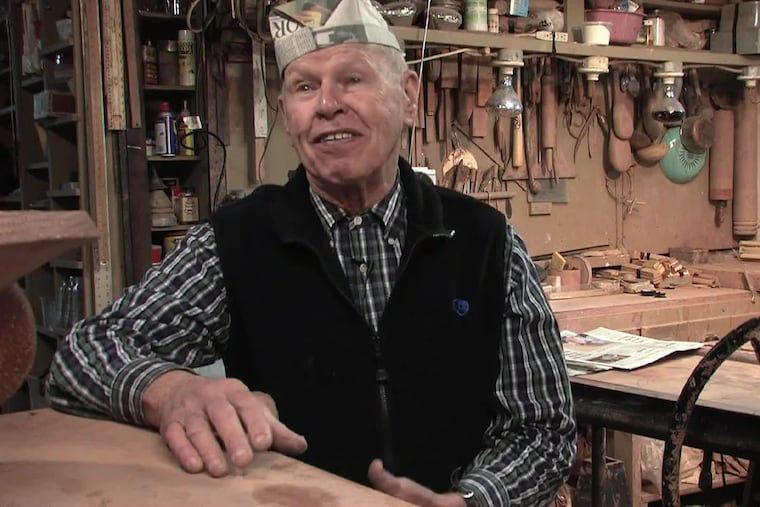William P. Daley, celebrated ceramic artist and longtime professor, dies at 96
Former Inquirer art critic Edward J. Sozanski called his work "both humble because of their reddish, raw-clay color and regal because of their carefully calculated symmetries."

William P. Daley, 96, an internationally celebrated ceramic artist and art professor, died Sunday, Jan. 16, of heart failure at his home in Elkins Park.
Mr. Daley was part of what is known as the American studio craft movement, a shift that took root after World War II during which artists rejected mass production of both crafts and art and combined the two. Mr. Daley worked most often in clay — he called it mud — and many of his pieces, true to the movement, are equally functional and inspiring.
As an example, Mr. Daley noted in a 2010 Inquirer video that a cistern he created not only collected water but was specifically designed to convey “the idea that rain is a sacred event.”
“Craft is absolutely vital to making art,” Mr. Daley said in the video. “But if it’s only craft, it can’t be art. … All art has to be useful either psychically, intellectually, or emotionally.”
In addition to his many signature pieces of large unglazed stoneware vessels, Mr. Daley created screens, walls, fountains, and other objects. His work is shown in museums in Philadelphia, New York, Washington, London, the Netherlands, Russia, South Korea, and elsewhere.
His large-scale architecture can be seen, among other places, in Philadelphia at Landmark’s Ritz Five movie theater on Dock Street, and Germantown Friends School on West Coulter Street; and in West Chester at the Westminster Presbyterian Church on West Pleasant Grove Road.
Elisabeth Agro, curator of American modern and contemporary crafts and decorative arts at the Philadelphia Museum of Art, said Mr. Daley “profoundly influenced many in the field of American craft” and “engaged in deep contemplation of mankind’s ‘inner spiritual grace.’”
Ruth Fine, former curator of special projects in modern art at Washington’s National Gallery of Art, said Mr. Daley was of “immense importance in [Philadelphia’s] attention to the craft-based arts.”
Mr. Daley also taught in the crafts and industrial design departments at Philadelphia College of Art, now University of the Arts, from 1957 to 1990, and dozens of his students went on to distinguish themselves in ceramics, glass, furniture, and design.
William R. Valerio, the director and CEO of Philadelphia’s Woodmere Art Museum, called Mr. Daley “a generous teacher who made an impact on the thinking of generations of artists.”
Mr. Daley held dozens of exhibitions, received many awards for both his art and teaching — including the 1991 College Art Association of America Distinguished Teaching of Art Award — and wrote for his own website. He and Helen Drutt were founders of the Philadelphia Council of Professional Craftsmen, and the Helen Drutt Gallery in Philadelphia was his primary dealer.
He sometimes even encouraged those viewing his work to handle the pieces to better embrace their emotional impact. “All art is that connection between one human being and another, a kind of communication,” he said in 2010.
In 2009, Inquirer art critic Edward J. Sozanski wrote that “the physical presence of [Mr. Daley’s] work is forceful and inescapable” and that “one is able to appreciate both the formal ingenuity and seductiveness of the compositions and the perceptual dualities they generate.”
Mr. Daley was born March 7, 1925, in Hastings-on-Hudson, N.Y. He served in the Army Air Corps during World War II, was shot down on his first mission as a tail gunner, and spent a year as a prisoner of war in Turkey and Germany before being liberated.
Using the GI Bill, he graduated with a bachelor’s degree in art education from the Massachusetts College of Art in 1950 and two years later earned a master’s degree in education from Teachers College, Columbia University.
He met fellow student Catherine Anne Stennes in a college art class, and they were married for 70 years. They had son Thomas and daughters Barbara and Charlotte, and lived in Elkins Park. His wife died in 2021.
Mr. Daley was known for his sense of humor and the 21 variations of newspaper pressman hats he liked to make and wear as he worked. He preached learning by doing and called himself the “octogenarian mudman” when he turned 80.
“The world is poorer without him,” a former student wrote in an online tribute.
In addition to his son and daughters, Mr. Daley is survived by six grandchildren, three great-grandchildren, a sister, and other relatives. A brother died earlier.
Private services were Saturday, Jan. 22, and a memorial service is to be held later.
Donations in his name may be made to the Haystack Mountain School of Crafts, P.O. Box 518, Deer Isle, Maine 04627.